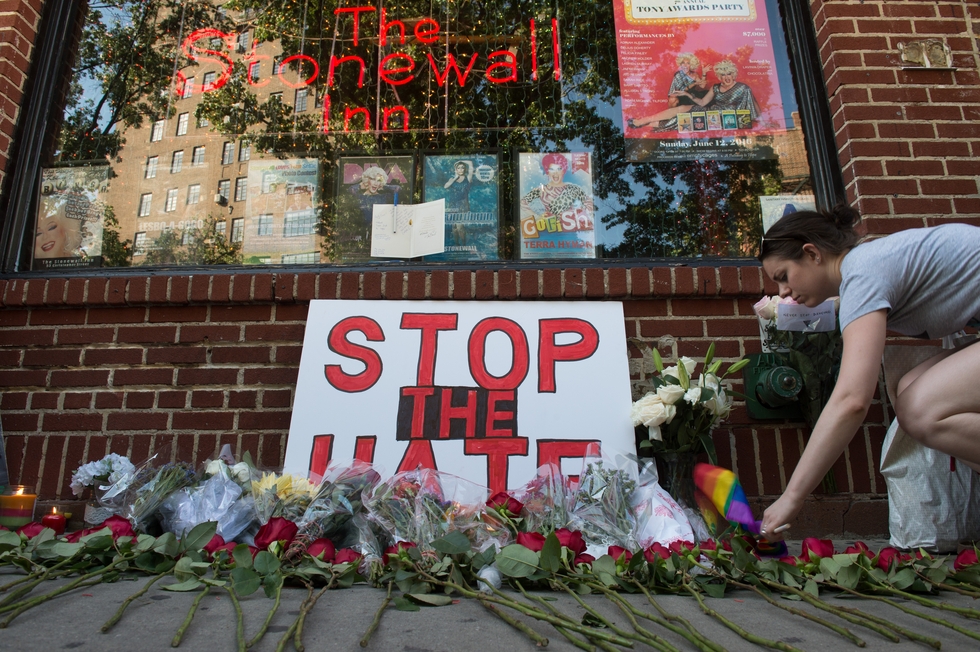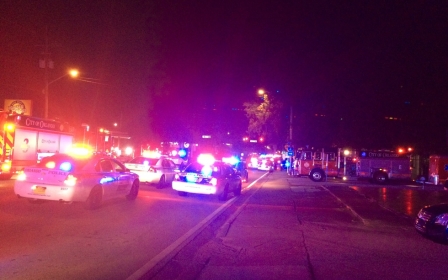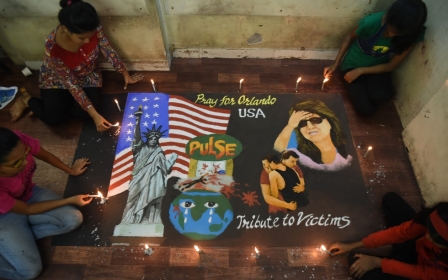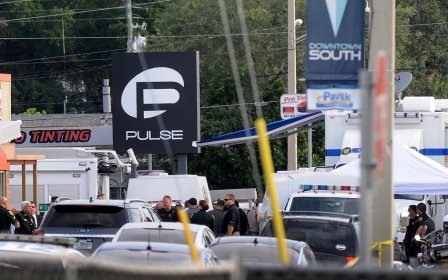No evidence Orlando attack was directed from abroad: Obama

US President Barack Obama said on Monday that there is no clear evidence that Sunday's attack at a gay club in Orlando, the worst mass shooting in US history, was directed from abroad.
Earlier on Monday the Islamic State (IS) hailed Omar Mateen, who shot 49 people dead and injured dozens of others, as a "soldier of the caliphate" in a message broadcast on the group's radio station.
IS's Iraq-based al-Bayan station was reported by AFP as saying: "God allowed Omar Mateen, one of the soldiers of the caliphate in America, to carry out an attack entering a crusader gathering in a nightclub... in Orlando in Florida, killing and wounding more than 100 of them."
Speaking at the Oval Office on Monday after a briefing from CIA officials, Obama said there was no clear evidence that the attack was directed from abroad.
There is also little evidence that Mateen was part of a wider plot, he announced, saying it appears likely that the shooter was inspired by extremist information he found on the internet.
Obama confirmed that the investigation, which is in its preliminary stages, is being treated as a "terrorist" probe - authorities are considering similarities between Sunday's attack and a shooting spree in San Bernadino, California, last year.
The head of the Federal Bureau of Investigation said on Monday that agents were "highly confident" that Orlando shooter Omar Mateen was "radicalised," at least in part through information he found online.
However, FBI chief James Comey said: "We see no indication that this was a plot directed from outside the United States, and we see no indication that he was part of any kind of network.
People close to Mateen, a Muslim American of Afghan descent who was killed by police while holding hostages, have painted a picture of a violent and prejudiced young man.
Police are investigating whether he had ties to, or was inspired by, religiously motivated militancy, after a source linked to the Islamic State group claimed the attack.
The FBI said Mateen apparently made an emergency call just before the massacre to claim allegiance to IS.
Meanwhile, White House hopeful Donald Trump vowed Monday to "suspend immigration" from nations with links to terror attacks targeting the United States or its allies.
"When I'm elected, I will suspend immigration from areas of the world where there is a proven history of terrorism against the United States, Europe or our allies, until we fully understand how to end these threats," Trump said during a national security speech in New Hampshire.
"We cannot continue to allow thousands upon thousands of people to pour into our country, many of whom have the same thought process as this savage killer."
Sunday's attack was carried out at Orlando's Pulse nightclub, a well-known gay venue.
But relatives interviewed by US media said Mateen, who worked as a security officer and had a wife and young son, was not especially religious.
They did, however, describe a man who had anti-gay views, mental health problems and was physically abusive to his ex-wife.
Mateen's father, Mir Seddique, said his son had recently been offended to see two gay men expressing affection on a Miami street.
"We were in downtown Miami, Bayside, people were playing music," the shocked father told NBC News in the immediate aftermath of the shooting.
"And he saw two men kissing each other in front of his wife and kid and he got very angry," Seddique said.
The father is a minor celebrity in Afghan political circles, hosting an occasional television show in which he expressed hardline views.
In the Durand Jirga Show, available on YouTube, he rails against the Pakistani government and announced a quixotic bid to seek the Afghan presidency.
"We are in shock like the whole country," Seddique added. "This had nothing to do with religion."
'Mentally ill'
Mateen's ex-wife said he was violent and mentally unstable - but not a religious extremist.
"A few months after we were married I saw his instability, and I saw that he was bipolar and he would get mad out of nowhere," Sitora Yusufiy told reporters outside her home in Boulder, Colorado.
"After a few months he started abusing me physically ... not allowing me to speak to my family, keeping me hostage from them."
Yusufiy, who met Mateen online and married him in 2009, said he was a practising Muslim but showed no signs of radicalisation.
"There was no sign of any of this at all," she said.
She noted that Mateen was "mentally unstable and mentally ill" and had a history of steroid use.
Steroids can cause mental problems, including paranoia and delusional thoughts.
When they split, "my family literally rescued me... they had to pull me out of his arms and find an emergency flight."
The pair were divorced in 2011, according to a court document seen by AFP, and Yusufiy said she has not had contact with Mateen in years.
Regular at mosque
The imam of the mosque where Mateen worshipped said he came to evening prayers three or four times a week, bringing his son who is about four or five years old.
"He would pray and his son would play," said Syed Shafeeq Rahman of the Islamic Center of Fort Pierce, who has known Mateen since 2003 when he became the imam.
Mateen did not socialise, leaving when services ended.
He didn't talk but would smile and shake hands, Rahman told AFP.
"I never expected this," Rahman said, holding a Quran in his hand as he spoke with reporters. "We teach peace and justice."
"It must be some kind of psychological problem or anger problem," the imam said, adding that Mateen might have been radicalised on the internet.
Bedar Bakht, who knew Mateen as a boy, said he saw him less than a week ago at the mosque with his young son, and that he seemed sad and was very quiet.
Mateen liked to talk about religion and could be intimidating when he argued, he said.
"He was very direct and really into bodybuilding," Bakht said. "He was huge at one point."
"He would tell you if he didn't agree with you," he continued. "He may have had some anger issues."
But Bakht said he never saw Mateen speak with hatred of any other group.
"He was respectful," he said. "I never heard him insulting women or gays."
Mateen owned a small calibre handgun and worked as a guard at a secure facility for juvenile delinquents.
Authorities said he bought a handgun and a long gun two days before the attack.
According to the Florida Department of Agriculture and Consumer Services website, he had a gun licence set to expire in September of next year.
New MEE newsletter: Jerusalem Dispatch
Sign up to get the latest insights and analysis on Israel-Palestine, alongside Turkey Unpacked and other MEE newsletters
Middle East Eye delivers independent and unrivalled coverage and analysis of the Middle East, North Africa and beyond. To learn more about republishing this content and the associated fees, please fill out this form. More about MEE can be found here.




